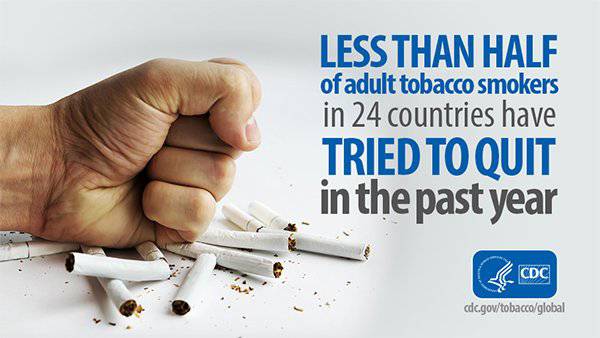You are here
CDC Foundation Work with Partners Globally Increases Knowledge about Tobacco Risks
In recent weeks, the Centers for Disease Control and Prevention (CDC) released a study in its Morbidity and Mortality Weekly Report (MMWR) on current tobacco smoking, quit attempts and knowledge about smoking risks among adults across 28 countries. The study found that the median prevalences of tobacco smoking and current tobacco smokers making a past-year quit attempt was 22.5 percent and 42.5 percent, respectively. In fact, in 24 of 28 countries, fewer than half of current tobacco smokers made a quit attempt in the preceding 12 months.
As part of the study, researchers analyzed 2008–2016 data from the Global Adult Tobacco Survey (GATS), which is a nationally representative household survey of adults 15 years of age or older. This research also showed that knowledge about the risks associated with tobacco smoking was relatively high across the 28 countries. Additionally, knowledge that tobacco smoking causes stroke, heart attack and lung cancer was significantly higher among nonsmokers than smokers in most of the countries.
The results from the study offer insights into the importance of implementing strategies that increase knowledge about tobacco smoking risks to reduce smoking prevalence, increase cessation attempts and increase successful cessation. The World Health Organization (WHO) Framework Convention on Tobacco Control (FCTC) and the MPOWER package provide countries with proven strategies to combat the tobacco epidemic by implementing evidence-based programs and policies.
One of the MPOWER measures includes warnings about the dangers of tobacco via graphic health labels and mass media campaigns to increase knowledge that tobacco smoking causes chronic disease, including stroke, heart attack and lung cancer. Implementing strategies such as these can reduce tobacco use and tobacco-related disease and curb the estimated one billion tobacco-related deaths estimated to occur in the 21st century.
The CDC Foundation is grateful to work with CDC, WHO and other global partners to implement GATS globally to reduce the health burdens caused by tobacco usage.

